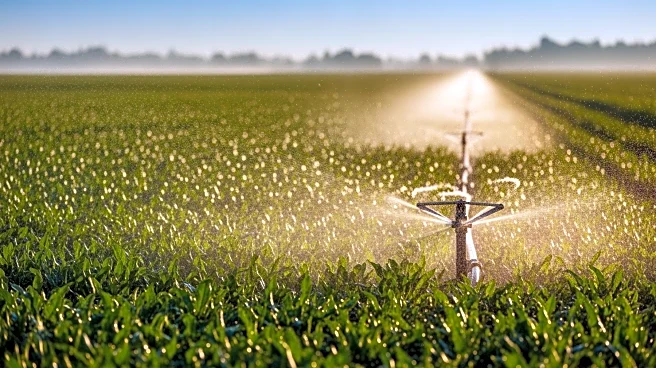What's Happening?
The agriculture industry is facing significant challenges due to weather volatility, water scarcity, and the need to feed a growing global population. Precision irrigation technology has emerged as a key
solution to these issues, enabling farmers to optimize water usage and enhance crop yields. This technology uses advanced tools like soil moisture sensors and weather forecasting to deliver water and nutrients precisely when and where crops need them. The global market for precision irrigation is projected to reach nearly $7 billion by 2029, reflecting its growing accessibility and importance in sustainable agriculture. Despite the promise of technology, the success of precision irrigation relies on integrating human expertise with digital innovation to create a resilient food supply.
Why It's Important?
Precision irrigation is crucial for addressing water scarcity, which affects over 40% of the world's population and disrupts economies and ecosystems. Efficient irrigation is essential for sustainability, as agriculture accounts for over 70% of global water usage. By minimizing waste and maximizing crop yields, precision irrigation supports healthier ecosystems and reduces environmental footprints. It also reinforces regenerative agriculture practices, contributing to climate change mitigation by enhancing soil health and carbon sequestration. The integration of technology and human expertise is vital for making effective decisions and ensuring the long-term sustainability of agriculture.
What's Next?
As precision irrigation technology continues to evolve, it will play an increasingly vital role in building a sustainable agricultural future. The integration of automation and IoT technologies will further revolutionize irrigation management, allowing farmers to monitor and control irrigation remotely. The success of these technologies depends on the direct engagement of farmers and agronomists who can interpret complex data and implement practical strategies. The future of sustainable agriculture requires a collaborative approach, where technology and human expertise work together to adapt to global challenges and ensure food security.
Beyond the Headlines
Precision irrigation not only addresses immediate agricultural challenges but also contributes to long-term environmental sustainability. By supporting regenerative agriculture practices, it helps maintain soil fertility and mitigate climate change. The technology's ability to enhance plant and microbial activity fosters healthier ecosystems and reduces nutrient runoff and soil erosion. As these systems become smarter and more integrated with renewable energy sources, they will play a crucial role in transforming agriculture and ensuring a resilient global food system.










